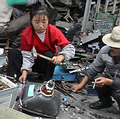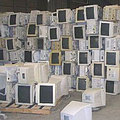 120個國家的政府代表1日誓言對抗電子廢棄物漸升的浪潮,並使用「回收廢棄電子產品計畫」與「緊急行動」以對抗非法的電子廢棄物交易商。每年,全世界約製造高達5,000萬公噸的電子廢棄物。
120個國家的政府代表1日誓言對抗電子廢棄物漸升的浪潮,並使用「回收廢棄電子產品計畫」與「緊急行動」以對抗非法的電子廢棄物交易商。每年,全世界約製造高達5,000萬公噸的電子廢棄物。
在第八屆「巴塞爾公約」(有害廢棄物處置與跨境轉移公約)締約國大會中,與會代表聲明需要更迫切的行動來管理電子廢棄物,他們並決定重視電子電器產品的生命週期分析,並推廣低污染技術(clean technology)和綠色設計。
依據巴塞爾公約,各國有責任促成有害廢棄物最少化,電子廢棄物也是其一。電子廢棄物包括了鉛、鎘、汞等重金屬,以及包覆在塑膠元件內的物質,這類物質在燃燒時會產生戴奧辛和多環芳香族碳氫化合物等致癌物質。
支持並促成巴塞爾公約的聯合國環境規畫署(UNEP)亦派員與會,UNEP執行長史坦能表示:「政府必須發展有效率的管理制度,授權市場對電子廢棄物積極地提出反對權力。」
 史坦能還指出:「透過和私營企業與民間社會的合作,他們可以推廣收集廢棄物的連鎖站,將那些淘汰的物品送回原來的工廠再製或是回收。」
史坦能還指出:「透過和私營企業與民間社會的合作,他們可以推廣收集廢棄物的連鎖站,將那些淘汰的物品送回原來的工廠再製或是回收。」
位於華盛頓州西雅圖「巴塞爾行動網」(Basel Action Network,BAN)的帕科特備受鼓舞地說:「終於,大會瞭解了NGOs長久以來關注電子廢棄物的嚴重性,發願為電子產品綠色設計展開行動,並結束全球性電子廢棄物的非法交易行為。」
30日各國部長及企業主管及非政府組織和NGOs一起探討改進收集、分類、重新利用、重新翻修及回收淘汰電子廢棄物的過程,最後大會通過奈若比宣言,確立了減少電子廢棄物及減少跨國際運送這些電子廢棄物的重要性。
Representatives of 120 governments pledged Friday to fight the rising tide of electronic waste, or e-waste, with projects to take back obsolete electronics and with "urgent action" to fight illegal e-waste traffickers. Each year, up to 50 million metric tons of e-waste are generated worldwide.
Declaring that urgent action is needed to take charge of e-waste, delegates at the eighth meeting of the Conference of the Parties to the Basel Convention on the Transboundary Movement of Hazardous Wastes and their Disposal decided to back a life-cycle approach and promote clean technology and green design for electronic and electrical products.
The Convention has an obligation to minimize the generation of hazardous waste, including electronic waste, which contains lead, cadmium, and mercury and are housed in plastic casings that emit carcinogenic dioxins and polyaromatic hydrocarbons when burned.
"Governments need to develop effective regulatory regimes that empower the market to respond positively to the challenge of e-wastes," said Achim Steiner, executive director of the United Nations Environment Programme (UNEP), under whose auspices the Basel Convention was adopted.
"By partnering with the private sector and with civil society, they can promote collection chains that channel obsolete goods back to their original manufacturers for recovery and recycling," Steiner said.
Jim Puckett of the Basel Action Network, based in Seattle, Washington, was encouraged by the outcome. "Finally, the Convention fully recognized what NGOs had been saying for a long time about the seriousness of the e-waste crisis and vowed to take actions for green design of electronics and for closing off global e-waste trafficking," he said.
After a one day forum on e-waste held Thursday, ministers, corporate officers, and nongovernmental organizations, NGOs, explored solutions for advancing the collection, separation, re-use, refurbishment and recycling of obsolete electronic products. Finally, the conference approved the Nairobi Declaration, which states the importance of minimizing the generation of e-waste and reducing transboundary movements of these wastes.





